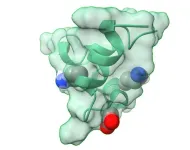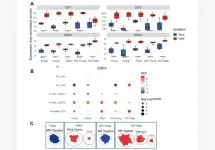(Press-News.org) COLUMBUS, Ohio – Scientists have established the effectiveness of vaccines they developed to prevent the disfiguring skin disease leishmaniasis in animal studies, and Phase 1 human trial planning is in motion for the most promising candidate.
But in new work, the research team has determined how these vaccine candidates, created using mutated disease-causing parasites, prompt molecular-level changes in host cells that have specific roles in helping generate the immune response.
Despite using the same CRISPR gene-editing technique to make the vaccines, the two species of Leishmania parasites on which the vaccines are based produced very different effects in the immunized host: One enables the immune response to unfold by inhibiting a host metabolite that suppresses immune activity, and the other drives up activation of a chemical pathway in a way that primes immune cells to fight pathogens.
“I think it’s an important finding in the sense that we show that in the big picture, yes, these vaccines are protective, but at the molecular level the mechanisms can be totally distinct,” said Abhay Satoskar, professor of pathology in The Ohio State University College of Medicine and co-leader of the research team.
“This is not only conceptually important, but if you can find how these things are modulating the immune response in the right direction, and identify the pathways, then perhaps those pathways could be used for developing new interventions,” said Satoskar, a senior author of two new papers describing the findings.
The primary vaccine was made by editing the genome of Leishmania major, which causes cutaneous leishmaniasis in tropical and subtropical regions of the Eastern Hemisphere, and a backup vaccine was made using Leishmania mexicana, a more virulent species found in South, Central and North America.
The study findings on the metabolic effects of the L. major and L. mexicana vaccines were published Aug. 29, 2023, in the journal iScience.
Leishmaniasis is prevalent in 90 countries affecting about 12 million people globally at any given time, but no licensed human vaccine yet exists and the only drug treatment for the skin lesions requires weeks of daily injections with unpleasant side effects. The more lethal visceral leishmaniasis affects organs and is fatal if left untreated.
In developing these live attenuated vaccines, Satoskar and colleagues applied new technology to the century-old Middle Eastern practice of leishmanization – introducing the live parasite to the skin to create a small infection that, once healed, leads to life-long immunity against further disease.
The researchers previously reported using CRISPR to delete centrin, the gene for a protein that supports the parasite’s physical structure, from the genomes of both L. major and L. mexicana. Experiments showed vaccinated mice remained clear of skin lesions and the number of parasites at the infection site were held at bay.
Digging deeper into the vaccines’ effects in these new studies, researchers inoculated mouse ears with a normal parasite, a mutated parasite vaccine or a placebo, mimicking the bite of a sand fly – in humans and animals, leishmania is transmitted through the bite of infected sand flies.
The team used mass spectrometry at the inoculation site to identify the most prominent metabolites – the amino acids, vitamins and other small molecules produced as a result of metabolism, the many chemical reactions that keep the body functioning.
Results showed the L. major vaccine promoted a pro-inflammatory metabolic response in mice by using the amino acid tryptophan to block signals from a molecule that helps suppress immunity. The L. mexicana vaccine, on the other hand, enriched a series of metabolic reactions that activated the necessary pro-inflammatory work of front-line immune cells.
“We took an unbiased approach to analyze the metabolites detectable at the inoculation site. There is growing interest in understanding the role immune cell metabolism plays in modulating immune function,” said Satoskar, also a professor of microbiology at Ohio State. “We also learned that by removing the centrin gene, we got rid of the parasites’ ability to manipulate metabolic pathways in a way that would impair development of protective immunity and, in fact, promoted vaccine-induced immunity. That’s important to know for a live attenuated vaccine – there is a unique case for each parasite species.”
Though this information is not required for regulatory approval of these vaccines, the data could prove useful to supplementing vaccination.
“There are only four existing drugs for leishmaniasis,” Satoskar said. “We need to know the mechanism of vaccines so the knowledge can be used to develop newer vaccines or newer drugs that target these pathways. What you learn from immunomodulation can be used for developing other therapeutic agents.”
This research was funded by the Global Health Innovative Technology Fund and the Center for Biologics Evaluation and Research within the Food and Drug Administration (FDA). The FDA is a co-owner of two U.S. patents associated with the mutated Leishmania species.
Co-authors of both papers include Sreenivas Gannavaram and Hira Nakhasi, who co-led the L. major study, and Nazli Azodi and Hannah Markle, all of the FDA; Greta Volpedo of Ohio State; Timur Oljuskin of the USDA Animal Parasitic Diseases Laboratory; Shinjiro Hamano of Nagasaki University; and Greg Matlashewski of McGill University. Thalia Pacheco-Fernandez of Ohio State co-authored the L. mexicana paper and Parna Bhattacharya of FDA co-authored the L. major paper.
#
Contact: Abhay Satoskar, Abhay.Satoskar@osumc.edu
Written by Emily Caldwell, Caldwell.151@osu.edu; 614-292-8152
END
Since 2009, the number of veterans experiencing homelessness across the United States has shrunk by more than 50%, according to a 2022 Department of Housing report.
With the support of a $150,000 grant from the Department of Veterans Affairs (VA), the University of Missouri School of Law Veterans Clinic is aiming to continue this trend here at home with a new program designed to further empower veterans in taking steps out of homelessness.
The Veterans Outreach Program will help attorneys connect with veterans experiencing homelessness with the goal of offering them the legal assistance ...
Although the COVID-19 pandemic was the first time most of humanity learned of the now infamous disease, the family of coronaviruses was first identified in the mid-1960s. In a new study, molecular biologist Steven Van Doren, a scientist in the University of Missouri College of Agriculture, Food and Natural Resources, has uncovered unexpected actions of a key player in how the coronavirus infects its target — a discovery that could guide further vaccine development.
Funded by a National Science Foundation (NSF) grant, Van Doren and his team studied the fusion peptide, an important feature of the spike protein that serves to bind the virus with ...
“To our knowledge, our study is the first to evaluate the specific function of Dectin-1 in the setting of aging and HIV-infection.”
BUFFALO, NY- August 31, 2023 – A new research paper was published on the cover of Aging (listed by MEDLINE/PubMed as "Aging (Albany NY)" and "Aging-US" by Web of Science) Volume 15, Issue 16, entitled, “Dectin-1 stimulation promotes a distinct inflammatory signature in the setting of HIV-infection and aging.”
Dectin-1 is an innate immune receptor that recognizes and binds β-1, 3/1, 6 glucans on fungi. In this new study, researchers Archit Kumar, Jiawei Wang, Allen Esterly, Chris ...
A recent study published in Nature Metabolism has revealed the pathogenic mechanism underlying a rare pediatric neurodegenerative disorder known as mitochondrial enoyl reductase protein-associated neurodegeneration (MEPAN) syndrome. The study was led by Dr. Hugo J. Bellen, distinguished service professor at Baylor College of Medicine, and Chair of Neurogenetics at the Jan and Dan Duncan Neurological Research Institute at Texas Children’s Hospital (Duncan NRI), and Dr. Debdeep Dutta, a postdoctoral fellow in the Bellen lab. The Duncan NRI team found that in patients and animal models of this disorder, a large number of neurons ...
CLEVELAND– Case Western Reserve University biochemical researchers have identified a new function of a key protein that leads to cancer–a finding they believe could lead to more effective treatments for a range of cancers and other diseases.
The protein is LSD1 (lysine-specific histone demethylase 1A), which functions as a type of traffic cop inside human cells. It controls gene activity during embryonic development and regulating gene expression throughout life.
Scientists have also identified in recent years that the overexpression of LSD1—in this instance, producing too many proteins—can ...
BUFFALO, N.Y. – The ability to accurately detect heat and pain is critical to human survival, but scientists have struggled to understand on a molecular level exactly how our bodies sense these potential risks.
Now, University at Buffalo researchers have unraveled the complex biological phenomena that drive these critical functions. Their research, published in the Proceedings of the National Academy of Sciences on Aug. 28, has uncovered a previously unknown and completely unexpected “suicidal” reaction in ion channel receptors that explains the complicated mechanisms that underlie sensitivity to temperature and pain.
The ...
Researchers from Trinity College Dublin have discovered some new and surprising ways that viral RNA and influenza virus are detected by human lung cells, which has potential implications for treating people affected by such viruses.
Influenza viruses remain a major threat to human health and can cause severe symptoms in young, elderly, and immuno-compromised populations, leading to annual epidemics which endanger between 3 and 5 million people of severe illness and cause 290,000 to 650,000 deaths worldwide.
These viruses primarily target respiratory epithelial cells ...
PHILADELPHIA – A broad new strategy could hold hope for treating virtually all blood cancers with CAR T cell therapy, which is currently approved for five subtypes of blood cancer. Scientists in the Perelman School of Medicine at the University of Pennsylvania have demonstrated the potential efficacy of this approach in preclinical tests.
In the study, published today in Science Translational Medicine, the researchers used engineered CAR T cells to target CD45—a surface marker found on nearly all blood cells, including nearly all blood cancer cells. Because CD45 is found on healthy blood cells too, the research team used CRISPR base-editing to develop a method ...
JooYoung Seo, assistant professor in the School of Information Sciences at the University of Illinois Urbana-Champaign, has been awarded a $649,921 Early Career Development grant from the Institute of Museum and Library Services (IMLS grant RE-254891-OLS-23), under the Laura Bush 21st Century Librarian Program, which supports “developing a diverse workforce of librarians to better meet the changing learning and information needs of the American public by enhancing the training and professional development of librarians, developing faculty and library leaders, and recruiting and ...
PHILADELPHIA (August 31, 2023) – A main crux of neuroscience is learning how our senses translate light into sight, sound into hearing, food into taste, and texture into touch. Smell is where these sensory relationships get more complex and perplexing.
To address this question, a research team co-led by the Monell Chemical Senses Center and start-up Osmo, a Cambridge, Mass.-based company spun out of machine learning research done at Google Research, Google DeepMind (formerly known as Google Brain), are investigating how airborne chemicals connect to odor perception in the brain. To this end they discovered that a machine-learning ...




